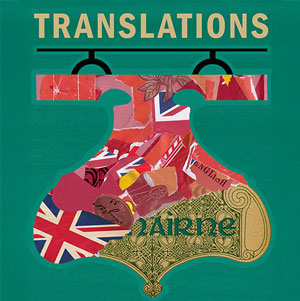
 [rating=4]“Thy eternal summer shall not fade,” Shakespeare once said. But neither do the stars. Behind a wispy curtain of clouds, the stars up high shone brightly upon the stars on stage throughout opening night’s performance of Shakespeare’s “Much Ado About Nothing.” This production in modern dress is directed by Melanie Keller and culminates the 45th year of classical outdoor theater at Austin Gardens under the auspices of the Oak Park Festival Theatre and the Park District of Oak Park.
[rating=4]“Thy eternal summer shall not fade,” Shakespeare once said. But neither do the stars. Behind a wispy curtain of clouds, the stars up high shone brightly upon the stars on stage throughout opening night’s performance of Shakespeare’s “Much Ado About Nothing.” This production in modern dress is directed by Melanie Keller and culminates the 45th year of classical outdoor theater at Austin Gardens under the auspices of the Oak Park Festival Theatre and the Park District of Oak Park.
“Much Ado About Nothing” is a misnomer. It is actually much ado about the missteps, miscommunications, and mysteries surrounding love in its many forms.
Love is simple for Claudio (Ian Michael Minh) and Hero (Tina El Gamal), who quickly succumb to “love at first sight.” In contrast, it is a much more complicated affair for Beatrice (Eunice Woods) and Benedick (Bryan Wakefield), who constantly snipe at each other; yet their wordy and nuanced debates strengthen the attraction between them. In fact, their personalities are so much alike that each has secretly made up a list of ideal qualities that they would like to find in a mate of the opposite sex. 
Woods shines in a performance that few could rival. Thoroughly convincing and beguiling in her role as Beatrice, her extraordinary acting ability is a force to be reckoned with. What a supremely confident and amazing talent, a guiding light to the rest of the performers! At the same time, Wakefield is versatile, eloquent, and dashing as Benedick, who, as his name indicates, is a man of good speech and diction with a remarkable aptitude for parlance.
Initially Benedick prefers not to be weighed down by a serious relationship and compares his single life as a merry man to that of being a married man. But friends and family intervene. They recognize that Beatrice is actually his soulmate. Secretly the two discover the same thing, but neither one wants to let go of their independent spirit or show any type of weakness by admitting to their affection for the other.
Villainy lies in the heart of Don John (Bret Tuomi), the illegitimate half-brother of Don Pedro (Peter Sipla) who is full of glee at the thought of wrongfully accusing Hero of the loss of her feminine virtue. He is a bastard in more ways than one—and provides a stark contrast to Hero’s father Leonato (Patrick Blashill), a generous, warm, and welcoming nobleman, and also to Dogberry, the constable (also played by Tuomi), who repeatedly calls himself an ass.
Beatrice and Benedick are alike not only in their war of words but in their belief in the inner goodness and morality of Beatrice’s first-cousin Hero, erroneously cast as being “every man’s Hero” (and thus being cast out of polite society). It is bad enough to be charged with immorality and indecency but to have this announced to the guests on her wedding day is an outrage. Why Claudio would shift his affections so radically and believe so quickly in gossip and false rumors about his bride-to-be represents his shallow level of understanding human nature and is thus susceptible to trickery. Ruled by his impulses, Claudio has no need to dig into larger truth—and for that matter, neither does Hero, as both are incapable of understanding love beyond its face value.
In sharp contrast, Benedick and Beatrice both require disguises—masks and contrivances—in order to find truth and uncover deceit, for both know that people may act and speak one way in front of each other and very differently behind each other’s back. Beatrice hides behind potted plants and Benedick hides behind a vertical beam (and even hides himself from inside the audience) in order to peer behind the superficial veneer of polite society and uncover what is actually being said. The fact that these two individuals think and feel at a deeper level than most allows each to have the courage of their convictions and to stand up for truth rather than succumb to chatting about scandal. Their love for each other is thus based on profound and abiding principles in tune with the strength of their personalities. 
True to the original, the play is set in Messina, a city in northeast Sicily. But the current adaptation takes place just after World War II. So why was the story shifted to the post-war and not some other time period?
With the end of Second World War in September 1945, Italy was in the throes of rebuilding the nation. The monarchy was abolished in June 1946 after a constitutional referendum and replaced by the Italian Republic. True to its origins, “Much Ado About Nothing” abounds with references to nobles and princes; however, one should note that these titles are still in use but are not legally recognized. More to the point, in a Catholic country like Italy, the defense of traditional Christian virtues dictated that a daughter’s virginity had to be protected. The most recent time period (working backwards) where this would have been the case without question would have likely been the 1950s, that is, prior to significant changes in morality worldwide associated with the 1960s feminist movement and the works of Betty Friedan and Gloria Steinhem.
 What is the final take-away of this tale of love and mistrust? In the play, an upright young woman contemplates suicide as a consequence of her besmirched reputation. In 2019, our sexual mores are largely different. That said, the pain of being shamed and humiliated publicly and being the subject of lies and ridicule is very real. Today much of this occurs via social media, where, for a lot of young people, the issue is not so much about loss of love per se but the loss of “like.” And “like” is very much a social phenomenon. Unremittent taunts and teasing have sadly led to an explosion of teen suicide among those who cannot bear the sting of personal attacks on their character and don’t have life’s experience behind them to withstand the verbal and emotional abuse. While content and context have changed between Shakespeare’s time and our own, treating people like dirt in an effort to disparage or discredit them—for whatever reason or motive—is always reprehensible. The need to preserve the integrity of a person’s word, deed, and good name is common to every era.
What is the final take-away of this tale of love and mistrust? In the play, an upright young woman contemplates suicide as a consequence of her besmirched reputation. In 2019, our sexual mores are largely different. That said, the pain of being shamed and humiliated publicly and being the subject of lies and ridicule is very real. Today much of this occurs via social media, where, for a lot of young people, the issue is not so much about loss of love per se but the loss of “like.” And “like” is very much a social phenomenon. Unremittent taunts and teasing have sadly led to an explosion of teen suicide among those who cannot bear the sting of personal attacks on their character and don’t have life’s experience behind them to withstand the verbal and emotional abuse. While content and context have changed between Shakespeare’s time and our own, treating people like dirt in an effort to disparage or discredit them—for whatever reason or motive—is always reprehensible. The need to preserve the integrity of a person’s word, deed, and good name is common to every era.
Last but not least, kudos to costume designer Rachel Lambert and assistant costume designer Gary Nocco. The women’s dresses are gorgeous and appropriate to the 1950s with their swing skirts and ample collars, inspired by Christian Dior’s ninety silhouettes in 1947. Leonato’s finely crafted suit is of 1950s vintage, while the tall black leather boots worn by Italian cavalrymen date from the early to mid-20th century. A nod must also be made to the diverse and masterful performers on stage, reflecting the bountiful talent that Chicago has to offer which makes this fantasy come alive.
Be ready to be whisked into a world where comedy melts into tragedy and tragedy melts into comedy, accompanied by the ever-present katydids and cicadas, singing praises to a warm summer’s night.
“Much Ado About Nothing” is playing from July 27 through August 31, 2019 at Austin Gardens, 167 Forest Avenue, Oak Park, IL 60301. Shows are Thursday through Saturday at 8:00 p.m., and Sunday at 7:00 p.m.
Open captioned performances are on August 8 through 11. 
Tickets are: $15 to $35.
Parking is available in the municipal parking garage directly across the street on Forest Avenue and in several other municipal lots nearby.
For more information, please contact: info@oakparkfestival.com
To see what others are saying, visit www.theatreinchicago.com, go to Review Round-Up and click at “Much Ado About Nothing”






More Stories
“Translations”
“The Firebugs” reviewed by Julia W. Rath
“The Book of Grace” Al Bresloff with another from Paul LIsnek